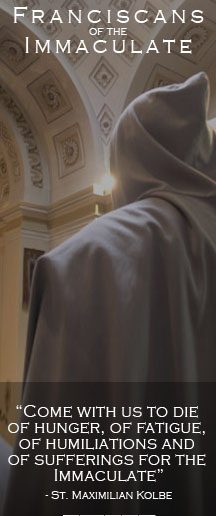In the concentration and death camp of Auschwitz, he voluntarily immolated himself, taking the place of a father who had been condemned to die of starvation in the terrible “death bunker.” The death of St. Maximilian Mary Kolbe as a martyr of charity was a death of supreme love, of that greatest love of which Jesus spoke when said, “greater love has no man than this, that a man lay down his life for his friends” (Jn 15:13).
There is a very strong connection between this love and the Saint’s famous phrase, “only love creates.” St. Maximilian Mary Kolbe opposed it to the murderous fury of the Nazi dictatorship then dominant. Hate kills, death destroys, and dictatorial power massacres: all this was being demonstrated by the murderous Second World War that sowed ruin upon ruin. Against that whole kingdom of Satan—“a liar and a murderer from the beginning” (Jn 8:44)—love rose up: charity, self-sacrifice, a way of life which St. Maximilian consummated with his heroic martyrdom. On the occasion of the sixtieth anniversary of the same event, someone wrote: “having enrolled in the school of the Immaculate, his beloved ‘fixation,’ St. Maximilian M. Kolbe was able to leave this brilliant saying to all mankind for all time. It was the Immaculate who gave the world the Incarnation and Redemption, which are the sources of the love and life that selfishness had destroyed in men and still attempts to destroy in them. She did this by means of Her virginal love as Daughter of the Father, Mother of the Son, and—in the stupendous words of St. Francis—Spouse of the Holy Spirit. The Immaculate is consequently the ‘summit of love in creation,’ St. Maximilian teaches that only in Her ‘the miracle of the union of God with creation takes place’ (SK 1310).”
The brilliant phrase of St. Maximilian, “only love creates,” is language that can only come from on high, from the infinite fount of love that is the Holy Spirit. St. Maximilian continually gave proof of the creative fecundity of this love in every field. He did this especially in the highest of fields, that of consecrated love, of total love for God and neighbor: this is the love that is the foundation of religious life, Franciscan life, Seraphic life. St. Maximilian, filled in extraordinary measure with divine love, was able to found two “Cities of the Immaculate”—one in Poland and the other in Japan—with nearly a thousand friars. These are a thousand consecrated lives, a thousand sons of St. Francis dedicated to living the evangelical life in its highest and purest form for the salvation of souls, doing so through the Immaculate Virgin Mary, the Mother of God and “Mother of the living” (cf. Gn 3:20).
Divine love creates life consecrated to God, which is a divine life of total love for God and our fellow man. In the footsteps of our ardent Seraphic Father St. Francis of Assisi, St. Maximilian Mary Kolbe set out. He was a son of Poland, a Marian land par excellence. He had the Marian heritage of Poland and the Marian patrimony of the Seraphic Order, born in the cradle of the totally Marian Portiuncula, St. Mary of the Angels, in the plains of Assisi. With these, St. Maximilian was formed from his childhood in the love of the Immaculate in so sublime and profound a manner that he rapidly came to be “mad with love for the Immaculate.” And he lived with this “madness of love” until his life ended with the holocaust of his martyrdom in the Auschwitz death camp. Some have suggested that St. Maximilian only became a martyr with the final act of charity, that of taking the place of the father of a family in the starvation bunker. However, we must never forget what the great Fr. Lacordaire once said: “The martyrs had already immolated themselves a hundred times in their hearts before they were sacrificed in reality.”
In fact, St. Maximilian lived his whole life as a martyr of the love of God and of the Immaculate, of St. Francis, and of all the souls to be saved. We need only consider the countless toil, stress, and suffering he bore to give life to the first City of the Immaculate in Poland (Niepokalanow), not to mention the legendary experience—a real martyrdom—of founding the second City of the Immaculate in Japan (Mugenzai no Sono). In both places his “madness of love” for the Immaculate sustained him in creating life, principally the religious vocations of about a thousand young men, consecrated to God and to the Immaculate as sons of St. Francis of Assisi. They too were committed to bringing the love that creates all over the earth for the eternal salvation of those who are “in darkness and in the shadow of death” (Lk 1:79).
“Only love creates”: what an outstanding lesson of life these three words contain for mankind today, stumbling about frighten and blinded by the “culture of death,” three words describing and producing the horrifying reality of over 40 million abortions every year! Abortion: this “abominable crime,” as Vatican II describes it (GS 51), involves the killing and death of over 40 million human lives! Every year a colossal world war! This truly is the “culture of Satan,” set against the “culture of God,” which alone is a culture of love and life.
May our great martyr of the charity that gives life, St. Maximilian Mary Kolbe, touch our hearts, enlighten our minds, and flood our spirits with the grace of his three words of life: “only love creates.” They are words that come from the “God of the living, and not of the dead” (cf. Mk 12:27).

